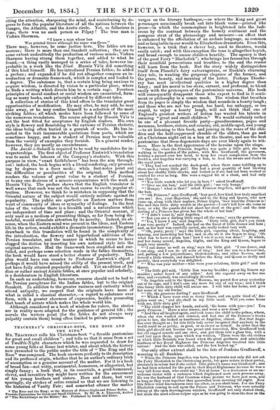citing the attention, sharpening the mind, and contributing by de-
grees to form the popular literature of all the nations between the Ganges, the Atlantic, and the Arctic circle. Yet, so fallacious is fame, there was no such person as Pilpay ! The true man is Vishnu Sharman.
"I knew a man whose loss Was printed Grove although his name was Gross." There may, however, be some justice here. The fables are nu- merous; there is more than one Sanskrit collection; they are to some extent undoubtedly the production of various minds; Vishnu Sharman having strung them together, and added to what he found,—a thing easily managed in a series of tales, however im- probable in a work like .the Iliad. Husain Wiz did something of this kind himself. He has introduced Persian fables; he added a preface ; and expanded if he did not altogether compose an in- troduction or dramatic framework, which is complex and loaded to a degree. The substance is, that a certain king being anxious to acquire wisdom, is directed by vision to a particular place, where he finds a writing which directs him to a certain sage. Fourteen principles of moral conduct or social wisdom are enunciated, form- ing as many books, each principle enforced by different tales.
A collection of stories of this kind ofl'ers to the translator great
opportunities of modification. He may alter, he may add, he may take away, or he may confine himself to a selection of the more striking fables; all which modes have been followed by some of the numerous translators. The course adopted by Husain -Wiz is not the best fitted for acceptance by English readers. His own style is flowery and flourishing to the extreme of Persian rhetoric, the ideas being often buried in a garnish of words. He has in- serted in the text innumerable quotations from poets, which are sometimes happy, and to a student of Persian may be valuable from the variety of examples they furnish. To a general reader, however, they are mostly an encumbrance. The ilnrdr.i-Suhaili is required to be read by candidates for in- terpreterships. The first object of Professor Eastwick's translation was to assist the labours of the Company's students. With this purpose in view, "exact faithfulness" has been the aim through- out : indeed, the book begins with a literal rendering, only proceed- ing by degrees to a freer mode ; while foot-notes point out the difficulties or peculiarities of the original. This method renders the volume of great value to a student of Persian, or to any one desirous of a minute acquaintance with the work of Husain Wiz. The preface shows that the English translator is well aware that such was not the best course to excite popular at- tention. However, we think he is mistaken in supposing that the Oriental nature of the subject would entirely militate against its popularity. The public are apathetic on Eastern matters from want of community of ideas or sympathy of feelings. In the best tales of the volume there is a breadth and a naturalness which are independent of time and place; and the Oriental manner, if only used as a medium of presenting things, so far from being dis- tasteful, would stimulate attention by its novelty. Indeed, its ab- sence, when the Eastern mind was present in the ideas, and Eastern life in the action, would exhibit a dramatic inconsistency. The great drawback to this translation will be found in the complexity of the introduction, the flowery and hyperbolical additions of the Persian translator, and the manner in which he seems to have clogged the diction by inserting his own national style into the original narrative. Had the framework been simplified and cur- tailed, and perhaps some selection made in the fables themselves, the book would have stood a better chance of popularity. This plan would have run counter to Professor Eastwick's object ; perhaps it would have missed the utility of the present work, and not have fuily attained popularity after all. Yet an edition of In- dian or rather ancient Asiatic fables, at once popular and scholarly, is a desideratum in English literature.
In such an undertaking, however, recourse should not be had to the Persian paraphrase for the Indian fables, but to the original Sanskrit. In addition to the greater raciness and curiosity which attend antiquity, we suspect that the originals have more of what is called a classical character,—a regard to substance over form, with a greater closeness of expression, besides possessing that touch of nature which makes the whole world kin.
Although considered as a book of wisdom for rulers, the stories are in reality more adapted for the guidance of general life ; the morals the writers point (for the fables do not always very palpably contain them) being often limited to private persons.




































 Previous page
Previous page